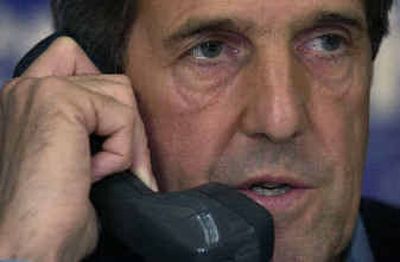Kerry unsure on nomination delay

BOSTON — Democratic presidential candidate John Kerry said Saturday he has yet to decide whether to delay his nomination at the party’s convention to improve his campaign’s financial prospects. But he said he wouldn’t put himself at a disadvantage.
“Boston will have the best convention ever put on no matter what decision,” the Massachusetts senator told local television stations in his first public comment on the proposed strategy.
“We’ve made no decision, I’ve made no decision personally, but I’m not going to put myself at a disadvantage to the Republicans,” Kerry said, according to WBZ-TV. “I’m not going to let silliness in the legal process deprive us of a full contest for the presidency of the United States.”
Each major party candidate will be eligible for $75 million in public money once he has accepted his party’s official nomination. Both Kerry and President Bush are expected to rely on public financing for the general election campaign.
But if Kerry were to be nominated at the July 26-29 Democratic convention, he would have to make that money last a month longer than Bush, who will accept the GOP’s blessing at its Aug. 30-Sept. 2 convention in New York.
Once the candidates are in the public financing system, they may not raise or spend private money.
Kerry and his advisers are considering several ways to cut down the financial advantage the later convention would give Bush. Delaying the nomination is one option under consideration, although it is the most dramatic of those that have been disclosed publicly; it would be unprecedented in American politics.
Several Democratic National Convention delegates said Saturday that Kerry has to do whatever he can to avoid taking a financial beating from Bush. But many interviewed Saturday by the Associated Press also said the convention would lose some of its excitement if the nomination came later.
“That takes some of the fun out of it,” said Patrick Johnson of Clinton, Iowa.
Delegate Gary Ficken of Cedar Rapids, Iowa, said, “I think it will be boring. I can’t imagine attending a convention and him not formally accepting and giving a speech.”
He said the purpose of the convention is “to get fired up, go back to our homes and get people out to vote for Kerry. I don’t know if that’s good in energizing at the grass-roots level.”
Both Johnson and Ficken said, however, that a later nomination probably would make sense to help Kerry win in November. “Unfortunately, money is a top priority,” Ficken said. “It’s sad but true.”
Former Vermont Gov. Howard Dean, who ran against Kerry in the Democratic primaries but now supports him, said Saturday he had his lawyers examine this option last November and December when he thought he might win the nomination.
“I thoroughly approve of this and think if we can find a legal way to do it we should do it,” Dean said in a telephone interview with the Associated Press. “It’s the only way you get to make up a five-week deficit and not let the Bush campaign pound the daylights out of us.”
“If this helps accomplish that goal, then more power to him,” said District of Columbia delegate Andy Litsky.
David Leshtz, a delegate from Iowa City, Iowa, said the nomination part of the convention amounts to mere ceremony since Kerry secured enough delegates to win the nomination months ago. He said eliminating it to get a financial advantage would be fine by him.
“On the surface it appears to be advantageous, and if it’s not illegal, why not?” he said.
Kerry advisers are examining the legal and financial considerations, as well as whether rejection of tradition at the convention would hurt him politically. The Bush campaign is planning how to counteract a convention without a nomination, including the possibility of a separate political rally with Bush elsewhere and demanding equal coverage.
“If John Kerry doesn’t accept the nomination, it’s not a nominating convention,” Bush campaign spokesman Steve Schmidt said. “It’s a consistent pattern of John Kerry believing the rules don’t apply to him.”
Kerry spokeswoman Stephanie Cutter said the convention would be no less important without an official nomination because it would still be a celebration for the party’s eventual nominee.
“What voters are going to see is someone who is aggressive and bold and ready to fight and fight to win,” she said.
Henry Yanez, a delegate from Harrison Township, Mich., said all the competition over funding probably will create more excitement among the delegates, even if there isn’t a nomination at the convention.
“We’ve talked about how the convention could be anticlimactic, but once we get there, that mood will probably change,” Yanez said. “It’ll probably be more intense. There will probably be more of a fighting spirit, because of the need to take this election.”